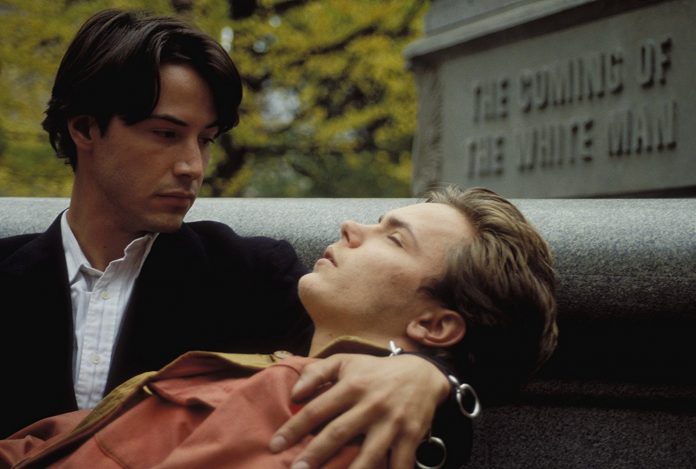Thirty years after its release, My Own Private Idaho remains one of the most uniquely honest pieces of cinema ever.
Fresh off the heels of his critically-acclaimed 1989 film Drugstore Cowboy, which starred 80s icon Matt Dillon, Gus Van Sant recruited two more Hollywood hotshots in the form of River Phoenix and Keanu Reeves to star in his next indie classic.
My Own Private Idaho follows Mike Waters (Phoenix), a young, narcoleptic street hustler with a tragic past who tends to pass out cold in moments of stress, often while prostituting. Mike travels and works with his best friend Scott Favour (Reeves), the rebellious son of the mayor of Portland, who works as a prostitute for petty cash and hangs around street hustlers while he awaits his inheritance.
There are several threads to follow in My Own Private Idaho, as the film is a commentary on the lives of young, queer street hustlers, trauma, road life and privilege vs. poverty, all at once.
Phoenix’s character Mike is at the centre.
He’s traumatized by his past, often falling unconscious at the thought of his estranged mother, leaving him at several points in the film helpless on the side of the road. Caught in an odyssey that always leads him back to a stretch of road in Idaho, Mike ponders if the road stretches around the globe.
While perhaps a bit exaggerated, this film portrays Mike’s trauma more intimately than other films, past and present, have dared to try, in particular when it comes to topics like homelessness, poverty and broken families.
“I think if I had a normal family, and a good upbringing, then I would have been a well-adjusted person,” Mike tells Scott as they sit by a campfire, a scene Phoenix wrote himself. Mike craves a family and a home, which he finds in Scott.
This is one of the main themes of the movie: young, queer love.
Mike confesses his love for Scott and is rejected. Scott says he only has sex with men for money, and Mike collapses into himself. Feeling bad, Scott cuddles Mike beside the fire while they fall asleep.
Less than 10 years after the beginning of the AIDS crisis, the stigma around queer relationships was present when this movie was made, and few portrayed queer relationships as anything more than offensive, over-sexualized stereotypes, if at all.
My Own Private Idaho is different. Although the relationship between Mike and Scott is complicated and tragic, it’s tender and honest.
The final, and perhaps most prominent theme of this film, which is a loose interpretation of Shakespeare’s Henry IV, is privilege vs. poverty.
Mike has been skating the poverty line since birth, stealing cars, sleeping on road sides and having to sell his body or rob to eat. Scott comes from a wealthy, well-respected family whom he rejects just for the sake of rebellion.
This movie is a commentary on the glamorization by the upper class of ‘street life.’ Scott does not see Mike’s situation, or those of the other street hustlers just trying to survive, as a tragic reality but rather a fun escape from the expectations of his parents. To him it is not life or death, just a thrill he can ride until he gets his inheritance and leaves that life, and all the people he pretended to love, behind.
The heavy themes of this film seem overbearing, but beautiful cinematography, powerful acting and a perfect soundtrack help viewers digest the drama.
This film leaves viewers heartbroken – in the best way possible.




